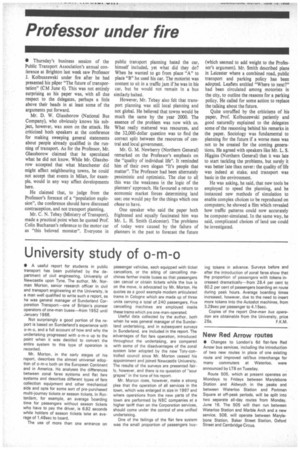University study of o-m-o
Page 42

If you've noticed an error in this article please click here to report it so we can fix it.
• A useful report for students in public transport has been published by the department of civil engineering, University of Newcastle upon Tyne. The author, Mr. Norman Morton, senior research officer in civil and transport engineering at the University, is a man well qualified to write such a report, as he was general manager of Sunderland Corporation Transport—one of Britain's pioneer operators of one-man buses—from 1952 until January 1968.
Not surprisingly a good portion of the report is based on Sunderland's experience with o-m-o, and a full account of how and why the undertaking progressed with o-m-o up to the point when it was decided to convert the entire system to this type of operation is recorded.
Mr. Morton, in the early stages of his report, describes the almost universal adoption of om-o both on the European Continent and in America. He analyses the differences between zonal fares systems and flat fare systems and describes different types of fare collection equipment and other mechanical aids and opts for some sort of pre-purchased multi-journey tickets or season tickets. In Rotterdam, for example, an average boarding time for passengers without season tickets who have to pay the driver, is 6.92 seconds while holders of season tickets take an average of 1.48sec to board.
The use of more than one entrance on passenger vehicles, each equipped with ticket cancellors, or the siting of cancelling machines farther inside buses so that passengers can cancel or obtain tickets while the bus is on the move, is advocated by Mr. Morton. He quotes as a good example modern articulated trams in Cologne which are made up of three units carrying a total of 240 passengers. Five cancelling machines are employed inside these trams which are one-man-operated.
Useful data collected by the author, both when he was general manager of the Sunderland undertaking, and in subsequent surveys in Sunderland, are included in the report. The advantages of flat fare operation, introduced throughout the undertaking, are compared with some of the disadvantages of the zonal system later adopted by the new Tory-controlled council since Mr. Morton ceased his appointment and joined Newcastle University. The results of the surveys are presented fairly, however, and there is no question of "sour grapesin the tone of his report.
Mr. Morton does, however, make a strong plea that the operation of all services in the town, which was enlarged in size in 1967 and where operations from the new parts of the town are performed by NBC companies at a higher tariff than on the Corporation services, should come under the control of one unified undertaking.
One of the failings of the flat fare system was the small proportion of passengers buy
ing tokens in advance. Surveys before and after the introduction of zonal fares show that the proportion of passengers with tokens increased dramatically—from 28.4 per cent to 60.2 per cent of passengers boarding en route during peak hours. Average boarding times increased, however, due to the need to insert more tokens into the Autoslot machines, from 3.29sec per passenger to 4.15sec.
Copies of the report One-man bus operation are obtainable from the University, price 25s. F.K.M.
























































































































































